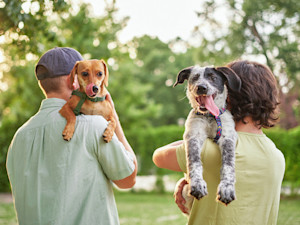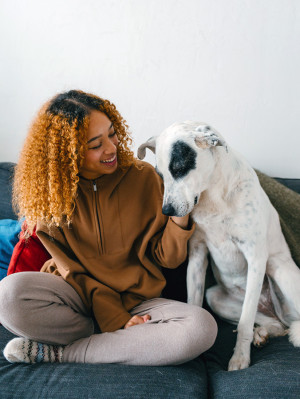Who Gets the Dog? The Heartbreaking Reality of Pet Custody
How to handle pet custody with care
When a relationship ends, there’s often a lot to untangle – shared homes, finances, memories and more. Sadly there is often a shared pet caught up in the mix too. But for most of us, a dog isn’t just a pet; they’re our best pal, our shoulder to cry on, our favourite companion for silly times, snuggles and fun days out. So when things fall apart, deciding who gets to keep the dog can be a lot more emotionally fraught than splitting the furniture or deciding who keeps the record collection (you, hopefully).
In the eyes of dog custody law, though, pets in the UK are still considered personal propertyopens in new tab, no different from a car or a sofa. That concept can feel jarring when you’ve built a deep emotional bond with your pup and can’t imagine life without them. Unfortunately, that legal status means pet custody in the uk isn’t always approached with the nuance or compassion we might hope for – especially if the breakup turns messy.
Whether you’re navigating a separation now or just want to plan ahead for all eventualities, it’s worth understanding how pet custody works in the UK. From how courts view pets to practical options like shared custody or ‘pet-nups’, here’s what you need to know when love ends – but the bond with your pet remains.
Who gets the dog, legally, if you break up or get a divorce?
At Kinship, we prefer not to use terms like ‘ownership’ when it comes to our pets – after all, we don’t own our partners or our children, so why should pets be any different? To us, they’re family, not property. That said, when it comes to the legal side of things, unfortunately, the language of ownership is unavoidable, so please bear with us as we navigate this tricky terminology.
This legal reality reflects a growing challenge many couples face. In fact, a 2022 study by Direct Let Pet Insuranceopens in new tab found that pets are increasingly at the centre of breakup disputes – with over a quarter (27 percent) of separations involving arguments over who keeps the pet. This concern has fuelled a 20 percent rise in demand for ‘pet-nups’ – prenuptial agreements designed to clarify pet arrangements before a split. Worryingly, nearly half (46 percent) of pet parents who’ve been through a breakup reported that their pet’s health suffered during the process. And it’s not just emotional strain, legal fees for resolving pet custody battles can soar, with some couples spending upwards of £7,000 to settle disputes.
Pet custody law: what you need to know
“Under English law, a pet is classed as propertyopens in new tab or a chattel,” explains Lara Myers, senior associate in the family department at Osbornes Law. “So in the event of a dispute, the Family Court will consider who the pet’s owner is. In doing so, they will look at who purchased the pet and who looks after it. The Family Court could order that the pet is sold and the proceeds divided between the parties just like a house or piece of furniture! Or they could order a transfer of ownership,” she says.
What is a pet custody agreement or ‘pet-nup’?
Pet custody agreementsopens in new tab – often referred to as ‘pet-nups’ – can be a useful tool for couples to outline arrangements for their pet in the event of a separation. A ‘pet-nup’ is a pre-agreed document that outlines who will care for the pet if the relationship ends. It can include:
who the pet lives with
visitation schedules
how expenses are shared
what happens if one party moves away or can no longer care for the pet
“Pet-nups and pre-nups are not fully binding in England but as long as they are entered into freely, there is full financial disclosure from each party and the agreement does not lead to an unfair outcome, then it would be upheld in court,” explains Lara. Having a clear agreement can help reduce conflict and provide a framework for future decisions. Think of it as a practical tool, not a romantic one.
What are your legal rights to your pet?
Pets can be considered assets in a divorceopens in new tab. However, since they are classified as property, their value is typically assessed in the same way as other possessions.
“If the parties are cohabiting but not legally married, the legal owner will be whoever purchased the pet – so ownership is actually more clearcut than if you were dealing with a divorce and purchased the pet as a married couple,” explains Lara. “The court would still treat the pet as a ‘chattel,’ and the matter would be dealt with in the Civil Court rather than the Family Court. Unlike in the Family Court, the Civil Court could make an order for damages for wrongful retention of the pet.“
So while pets can be part of the asset division process, their emotional value is not legally recognised, which can lead to disputes if both parties have a strong attachment to the pup (which is usually the case).
“There is a working group called ‘Pets on Divorce’, which is pushing for a move away from pets being treated as chattels by the courtopens in new tab,” says Lara. “However, I imagine Parliament will not prioritise this and it will sadly be many years before any change in the law takes place.”
How to avoid pet custody battles: dispute resolution
“In my experience, pet custody disputes usually form part of a much wider dispute concerning the division of all assets. Parties are usually able to sort out what happens to family pets between themselves or with the help of a mediator,” says Lara. “I am yet to go to court to deal solely with a pet custody dispute. I don’t think pet disputes are increasing, but the public are now far more aware about including pets in prenuptial agreements – the term ‘pet-nup’ seems to have caught on!”
So unfortunately you may be better off taking a different route than via the courts if you end up in a pet custody dispute. If you and your ex can’t agree on who should keep the dog – there are a few different options to help reach a solution before things get messy.
Mediation
“Mediation is extremely useful,” says Lara. This involves a neutral third party who helps both sides talk through the issues and ideally reach a mutual agreement. Mediation is informal, less costly than legal proceedings, and can preserve goodwill – which is especially helpful if shared care might be on the table. Mediators can help guide conversations around who’s best placed to care for the pet, and help put that into a clear agreement. “If the parties do not feel able to be in the same room they could also consider shuttle mediation, whereby the mediator goes between two rooms,” advises Lara.
Arbitration
“In arbitration, both parties agree to let an independent arbitrator review the situation and make a binding decision. It’s more formal than mediation but still quicker and cheaper than going to court,” explains law student Grace Mackenzie.
Factors influencing pet custody decisions
If you chose to go to arbitration or a mediator, there are a few talking points to consider:
Who the primary caregiver is
One of the strongest considerations in deciding who keeps the pet is who’s been the primary caregiver. This goes beyond simply who was around most often – it’s about who fed the dog, arranged vet visits, handled grooming, did the majority of the walking, and was generally the dog’s main point of comfort.
If one person has been doing the bulk of the hands-on, day-to-day care, this can show a clear emotional bond and routine that the dog may struggle to adjust away from. “Arbitrators may suggest keeping pets with the person who can best maintain that consistency – particularly if the dog has formed a strong attachment to them,” says Grace.
Financial responsibility
While love and care matter, so does the practical question of who paid the bills. If one person has taken the lead on financial responsibilities – paying for food, insurance, vet care, training, grooming and other expenses – this can be used to support the idea that that person should keep the dog.
Stability
A stable home environment is crucial for our pups, especially those who are sensitive to change. Third parties may look at factors such as:
Who has a more pet-friendly living situation (space to roam, a garden, pet-friendly tenancy or owns the property)?
Who has the time to be present and meet the dog’s emotional and physical needs?
Whether anyone travels often or works long hours, and how that might impact the dog’s care.
Your dog’s best interests
“While ‘the best interests of the dog’ isn’t a formal legal standard in the UK, it’s something that separating couples should try to consider,” says Grace.
This includes the dog’s:
Age and health: older or anxious dogs may need to stay in familiar surroundings.
Breed and temperament: high-energy dogs might benefit from a home with outdoor space and lots of activity.
Emotional bonds: some pets clearly prefer the company of one person, which may be taken into account if there’s disagreement.
When both parties genuinely want what’s best for the dog (even if that means not keeping them), these conversations tend to be more constructive and less painful.
Other things to consider
As well as practical considerations, here are a few things to think about emotionally and logistically:
Bond with the dog: this is a tricky one, but if you were really honest with yourselves, who does the dog naturally gravitate towards? Do they become anxious when separated from one person in particular?
Living situation: does one of you have a home better suited for the dog? For example, access to outdoor space, or pet-friendly landlords.
Work/lifestyle: who has the time to walk, feed and play with the pup every day? Dogs need presence and stimulation, not just love.
Finances: again, this is a difficult one to admit but who is better placed to cover vet bills, food and grooming?
Future plans: is one person planning to move abroad? Take on a demanding job? Travel regularly? This could affect long-term stability for your dog.
Willingness to compromise: if joint care is an option, are you both on good enough terms to manage that calmly?
Alternative solutions for pet custody
When both parties love the dog and want to stay involved, shared arrangements are worth exploring – particularly if you live nearby, are on speaking terms and didn’t burn all their clothes in a rage when you broke up.
Shared custody agreements
This can be a written agreement that lays out a custody schedule – for example, alternating weeks, weekends or visits during holidays. It can also cover vet decisions, expenses and what happens if one party moves away or gets a new partner.
“It’s not legally binding,” explains Grace. “But if the arrangement works and is respected by both parties, it can help the dog maintain bonds with both people while minimising disruption.”
Rotating living arrangements
If moving the dog between homes regularly feels too stressful for them (or you), a more creative solution could involve rotating who cares for the pet in the same location – for instance, if one person stays in the home with the dog while the other travels, and then swaps.
It’s not for everyone, but it’s an example of how flexible arrangements can work when both parties prioritise the dog’s wellbeing.
Do you need a pet-nup?
If you co-own a pet with a partner (or even a close friend or housemate), a pet-nup is a sensible conversation to have. Breakups are emotional enough – adding a pet into the mix can make things even harder.
Drawing up a pet-nup while things are still positive helps both of you focus on what really matters: making sure your pet continues to be loved and well cared for, no matter what happens between you. Although it may not be legally recognised in the courts, it’s a useful agreement to have.
The bottom line: who gets the dog in a breakup
Determining who gets the dog in a breakup can be complex, emotionally charged and the last thing you want to have to contend with while nursing a broken heart. So, if you’re still with your partner, now might be the time to think about drawing up a pet-nup to avoid disputes and difficulties down the line if the worst does happen.
Frequently asked questions
Who gets custody when there are two pets?
If there are multiple pets, custody decisions are typically made on a case-by-case basis, considering factors such as each pet’s attachment to each person and the ability of each person to care for them.
What happens to pets if we aren’t married?
For unmarried couples, the ownership of your pet would be considered under Civil Law rather than Family Law. If there was a dispute over ownership of your dog, then you would have to make a civil claim to the court to assert and prove ownership.
Is there a way to split custody of a pet equally?
Equal non-legally binding custody arrangements can be made, but they require cooperation and consideration of the pet’s wellbeing. Shared custody can be stressful for pets, so it’s important to assess whether it’s in their best interest.
Can someone legally take back a pet from an ex after a breakup or divorce?
If one party has legal ownership of the pet, they may have the right to take the pet back in the Civil Court.
Who legally gets the dog in a breakup in the UK?
Legally, if the couple are unmarried, the person who has ownership rights – based on purchase records, registration details and financial responsibility – would retain the pet.
Resources
Direct Line Group (2022) Who gets the dog? 56 per cent rise in dog divorcesopens in new tab
LBMW (n.d.) How does the law deal with your pet if you break upopens in new tab?
The Independent (2024) Many pet-owning couples may include their animal in a cohabitation agreementopens in new tab
Blanchards Law (n.d.) The ultimate guide to pet custody – all your questions answeredopens in new tab
Cooke, E. (2024) ‘The legal status of companion animals in English law’, in Rewriting Jurisprudence: Companion Animals in Legal Perspectiveopens in new tab. Oxford University Press
Cretney, S. (2014) ‘Pets, property and family law’, International Journal of Law, Policy and the Familyopens in new tab, 28(2), pp. 177–196
PHB Family Law (2023) The rise of a petnuptial agreementopens in new tab







